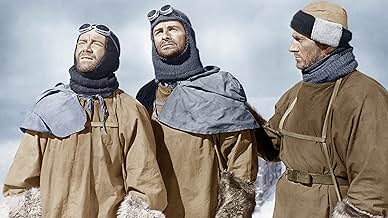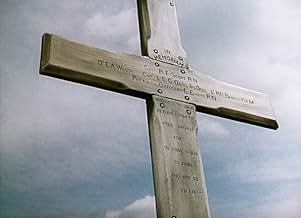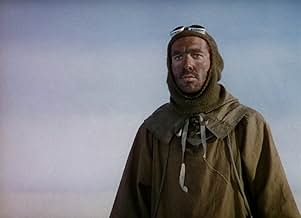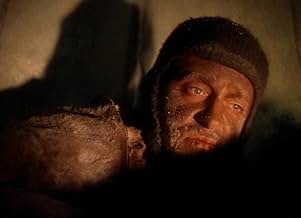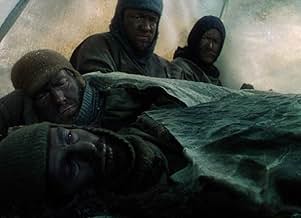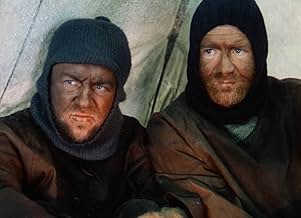ÉVALUATION IMDb
7,0/10
2,7 k
MA NOTE
L'histoire de l'expédition de l'explorateur britannique Robert Falcon Scott en 1912 et sa quête pour être le premier à atteindre le pôle Sud.L'histoire de l'expédition de l'explorateur britannique Robert Falcon Scott en 1912 et sa quête pour être le premier à atteindre le pôle Sud.L'histoire de l'expédition de l'explorateur britannique Robert Falcon Scott en 1912 et sa quête pour être le premier à atteindre le pôle Sud.
- Director
- Writers
- Stars
- Nominé pour le prix 1 BAFTA Award
- 1 victoire et 2 nominations au total
James McKechnie
- Surgeon Lt. E.L.Atkinson R.N.
- (as James Mc Kechnie)
Avis en vedette
Produced by Ealing Studios, Scott of the Antarctic is a stiff upper- lipped depiction of Captain Scott's infamous, ill-fated expedition to the South Pole. Facing freezing storms, starvation, lack of fuel, and having just digested the sobering revelation that Norwegian rival Roald Amundsen had beaten them too it, Scott and his remaining team of four settled and died just 11 miles from camp, where food, warmth and undoubtedly survival awaited them. Trading very much on the legend of Captain Scott, the film charms thanks to it's post-WWII optimism and gorgeous colour cinematography.
Beginning with a determined Scott, played heartily by John Mills, rounding up his crew, the film takes it's time to get to the Arctic. Relying on Captain Scott's beautifully written diary for its source of information, the film feels more documentary than straight feature. It is all the more detailed and authentic for it, but it comes at the expense of any real character development. By the time the credits roll, we know little more about Scott than when we started, apart from that he was obviously a determined and courageous man. But it makes up for this neglect with a startling final third, where director Charles Frend puts us through every step of Scott's exhausting final thrust to get back to civilisation.
Mills and the supporting cast (James Robertson Justice, Kenneth More, Harold Warrender et al) are excellent throughout, starting out as eager and boisterous, and later, as the last survivors wait to die in the tent that would become their tomb, withdrawn and contemplative. The setting plays as the main villain, and it's captured as both a place of isolated beauty and uninhabitable terror , thanks to Jack Cardiff's stunning cinematography, and it's the encroaching sense of doom that gives Scott of the Antarctic a raw power. Although it obviously ends badly, Scott's death proved to be the making of him. Amundsen was (somewhat cruelly) dismissed as a bad sportsman, and Scott was instantly labelled a hero for daring to stare such overwhelming odds in the face and hold his head high. For a country still recovering from the ravishes of war at the time of the film's release, it must have been a powerful sentiment indeed. One of Ealing's most overlooked efforts.
www.the-wrath-of-blog.blogspot.com
Beginning with a determined Scott, played heartily by John Mills, rounding up his crew, the film takes it's time to get to the Arctic. Relying on Captain Scott's beautifully written diary for its source of information, the film feels more documentary than straight feature. It is all the more detailed and authentic for it, but it comes at the expense of any real character development. By the time the credits roll, we know little more about Scott than when we started, apart from that he was obviously a determined and courageous man. But it makes up for this neglect with a startling final third, where director Charles Frend puts us through every step of Scott's exhausting final thrust to get back to civilisation.
Mills and the supporting cast (James Robertson Justice, Kenneth More, Harold Warrender et al) are excellent throughout, starting out as eager and boisterous, and later, as the last survivors wait to die in the tent that would become their tomb, withdrawn and contemplative. The setting plays as the main villain, and it's captured as both a place of isolated beauty and uninhabitable terror , thanks to Jack Cardiff's stunning cinematography, and it's the encroaching sense of doom that gives Scott of the Antarctic a raw power. Although it obviously ends badly, Scott's death proved to be the making of him. Amundsen was (somewhat cruelly) dismissed as a bad sportsman, and Scott was instantly labelled a hero for daring to stare such overwhelming odds in the face and hold his head high. For a country still recovering from the ravishes of war at the time of the film's release, it must have been a powerful sentiment indeed. One of Ealing's most overlooked efforts.
www.the-wrath-of-blog.blogspot.com
This was a terrific film. I first saw this movie in the summer in Atlanta when it was near 100 degrees and our air cond was not blowing very cold. Scenes in this film actually made me feel cold. I felt as though I had been on a journey to The South pole after this one. The final 45 minutes of this film are a gripping adventure, and does it without todays special effects.
The Ealing Studios production `Scott of the Antarctic' is a work of art and an inspiration to human achievement. The film depicts the polar explorers of the Second Scott Antarctic Expedition (1910-1913). They are portrayed first as pygmies against the terrible backdrop of the ice continent, then as dauntless giants within the enclosed spaces of their fragile tents as they await their certain death.
The mood of the film is High Victorian, although strictly speaking the setting is Late Edwardian. Edward Adrian Wilson, the artist, played by Harold Warrender, is the quintessential gentleman naturalist. As the film begins, Wilson is shown in the summery garden of his tranquil country homestead in England, meticulously creating a scientific illustration of a mounted bat. At the end, when Wilson is among the few remaining explorers who face frozen death in their wind-whipped tent, his spirit drifts away to his English home.
The Victorian faith in mechanisms is brought forth by close up shots of distance-measuring wheels that are attached to the backs of clumsy man-drawn sledges, and by the heroic but flawed powered tractors that break down in the awful cold.
The film invites the viewer to arrive at his or her own conclusions about the character of Captain Scott. The film makes no judgments - it merely portrays Scott through the superb acting of John Mills.
`Scott of the Antarctic' is a timeless film about eternal values: human endeavor, achievement and triumph.
The mood of the film is High Victorian, although strictly speaking the setting is Late Edwardian. Edward Adrian Wilson, the artist, played by Harold Warrender, is the quintessential gentleman naturalist. As the film begins, Wilson is shown in the summery garden of his tranquil country homestead in England, meticulously creating a scientific illustration of a mounted bat. At the end, when Wilson is among the few remaining explorers who face frozen death in their wind-whipped tent, his spirit drifts away to his English home.
The Victorian faith in mechanisms is brought forth by close up shots of distance-measuring wheels that are attached to the backs of clumsy man-drawn sledges, and by the heroic but flawed powered tractors that break down in the awful cold.
The film invites the viewer to arrive at his or her own conclusions about the character of Captain Scott. The film makes no judgments - it merely portrays Scott through the superb acting of John Mills.
`Scott of the Antarctic' is a timeless film about eternal values: human endeavor, achievement and triumph.
There have recently been a lot of dramatised and documentary programmes on UK terrestrial and satellite TV on the pioneering polar explorers, erstwhile rivals and colleagues Scott & Shackleton so I was keen to view this British made dramatisation of the former's doomed 1912 expedition to the South Pole. I was not disappointed. It is obviously difficult to maintain cinematic excitement for the viewer of what is basically a long march (a similar problem as in "The Spirit of St Louis" and "The Old Man & the Sea"), but the true to life tragedy here proves compelling in the end. Jack Cardiff's colour photography is splendid and I was surprised to observe so few "process" shots for a film from the 1940s, given the scale of the task here. John Mills is excellent in the key role of Commander Scott but the supports are all excellent, many of them chosen for their physical similarity to their real life counterparts - Mills too bears a more than passing likeness of physiognomy to Scott. In the post - war climate, Britain obviously sought comfort and inspiration from past heroes as the country rebuilt itself in economic austerity and Scott must have been an ideal model for glorification. Regardless of sniping comments from historians about Scott's poor planning, the film quite rightly avoids judgements and asks the viewer to recognise and admire the human heroism of these gallant men. There is surely no more tragic sacrifice in all exploration than Oates' "I'm going outside, I may be gone some time" - exit and the movie captures this moment with the necessary pathos, later repeating the sensitivity as Scott and his last two colleagues expire with the so near and yet so far "11 miles" on their freezing lips. The Vaughan-Williams music is suitably sweeping and elegiac. One wonders why Hollywood ignored the film at the Academy Awards of 1948, certainly the acting, cinematography and music, to name but three, were worthy of recognition. I wonder if anyone would remake it in the modern era as we approach the centenary of the triumph and tragedy of Scott's expedition. Are you listening Peter Jackson...?
The first thing to remember is that Scott fouled up mightily in his attempt to be the first to reach the South Pole in 1912. He was stubborn, rather arrogant, yet malleable to the wishes of his wife. When his diaries were found on his frozen remains they were in fact later edited and altered by his wife (and the publisher) to depict Scott as a Great Heroic Figure. That was a lie; the depiction of him in the movie is a lie. And in recent years the unedited diaries were released proving the old myth was not the reality. It should be added the U.S. polar explorer Richard C. Byrd was an even bigger fraud - as his recently released personal notes also demonstrated.
This film is generally well done, and the Antarctic (actually Greenland, I believe) scenery is spectacular. The very slow deterioration of Scott's team is fascinating to see; their heartbreak upon viewing Raoul Amundsen's Norwegian flag flying over the Pole in the distance - meaning they had lost the race to the greatest of all explorers - is palpable. From then on it becomes a matter of survival and getting back home. Bit by bit the elements wear them down - untill they can finally go on no longer. When one says "I don't want to wake up tomorrow" with the wind howling just outside their little tent as they try to eat a morsel of cold food. . . you know it's over for them. Heartbreaking.
BUT THE CAUSE OF THE DISASTER IS NOT DELINEATED!! WHY did it happen? Bad luck? Scott's decision not to rely only on sled dogs? Yes. But his planning and leadership was also flawed badly - and that was not shown, as mentioned above.
I had no particular problem with the acting. It could possibly have been more emphatic and emotive, but then I assume the English were indeed as stoic as depicted in the film. Mills' understated Scott is to be expected as part of the MYTHICAL version of Scott - the REAL Scott I have no doubt was more emotional and weaker, as seen in the uneditied diary.
All in all, a moving film worth seeing - so long as you know this is not the reality of the Scott expedition but the cleansed version to make Scott and company as heroic as possible. If you want a better Arctic film try "The Red Tent", and check the reviews on the IMDb for background on it.
This film is generally well done, and the Antarctic (actually Greenland, I believe) scenery is spectacular. The very slow deterioration of Scott's team is fascinating to see; their heartbreak upon viewing Raoul Amundsen's Norwegian flag flying over the Pole in the distance - meaning they had lost the race to the greatest of all explorers - is palpable. From then on it becomes a matter of survival and getting back home. Bit by bit the elements wear them down - untill they can finally go on no longer. When one says "I don't want to wake up tomorrow" with the wind howling just outside their little tent as they try to eat a morsel of cold food. . . you know it's over for them. Heartbreaking.
BUT THE CAUSE OF THE DISASTER IS NOT DELINEATED!! WHY did it happen? Bad luck? Scott's decision not to rely only on sled dogs? Yes. But his planning and leadership was also flawed badly - and that was not shown, as mentioned above.
I had no particular problem with the acting. It could possibly have been more emphatic and emotive, but then I assume the English were indeed as stoic as depicted in the film. Mills' understated Scott is to be expected as part of the MYTHICAL version of Scott - the REAL Scott I have no doubt was more emotional and weaker, as seen in the uneditied diary.
All in all, a moving film worth seeing - so long as you know this is not the reality of the Scott expedition but the cleansed version to make Scott and company as heroic as possible. If you want a better Arctic film try "The Red Tent", and check the reviews on the IMDb for background on it.
Le saviez-vous
- AnecdotesCaptain Scott's log and many of the personal effects of the explorers were loaned by The British Museum to add to the authenticity of this near-documentary.
- GaffesNo one's breath is ever visible in the Antarctic.
- Citations
Capt. L.E.G. Oates: I'm just going outside; I may be away some time.
[as he leaves tent for certain death]
- Générique farfeluRalph Vaughan Williams, then revered as Britain's greatest living composer, has an official credit consisting only of his surname, 'Vaughan Williams'.
- ConnexionsFeatured in Antarctica (1991)
- Bandes originalesWill Ye No Come Back Again?
(uncredited)
Traditional Scottish tune, and lyrics by Lady Carolina Nairne (as Carolina Oliphant, Lady Nairne)
Heard as the ship leaves New Zealand
Meilleurs choix
Connectez-vous pour évaluer et surveiller les recommandations personnalisées
- How long is Scott of the Antarctic?Propulsé par Alexa
Détails
Box-office
- Budget
- 2 370 000 £ (estimation)
- Durée1 heure 51 minutes
- Rapport de forme
- 1.37 : 1
Contribuer à cette page
Suggérer une modification ou ajouter du contenu manquant

Lacune principale
By what name was Scott of the Antarctic (1948) officially released in India in English?
Répondre
